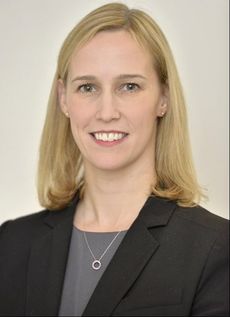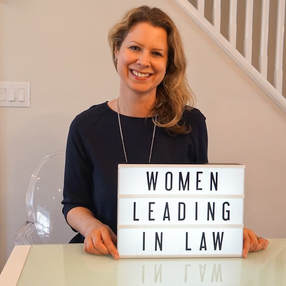 Reader feedback has led to this next profile of lawyer Nicole Chrolavicius. A reader wrote to inquire if I would be profiling any women who had successfully re-entered the practice of law after an extended absence, as she was seeking to return after a leave to raise her children. I reached out to my network and I am happy to say that this is the first of a few "successful return" stories that I will be posting. I hope these profiles will be helpful and encouraging to any lawyers contemplating a return to practice. Read on to learn more about Nicole, her career as a human rights lawyer, and how she transitioned back to law: 1. Tell me a little about your practice or business: I currently work as Counsel to Pooranlaw Professional Corporation, a leading social justice law firm dedicated to a just society for persons with disabilities and other marginalized groups. I also lecture in Constitutional Law and Legal Ethics in the Osgoode Professional Development LL.M. in the Canadian Common Law program. This dual role is perfect for me at this stage of my life and demonstrates that sometimes professional happiness resides in the road less travelled. By way of explanation, I actually took a five year break from the practice of law (from 2011 – 2016) to be home with my family. The arrival of our son Julien in 2011 was followed closely by the arrival of a surprise set of twins, Luke and Benjamin, in 2012. Having three boys in less than 16 months was not part of the plan; however, my husband and I embraced the “cute chaos” (our catch-phrase) and I decided to take a break from my career to explore a new role as mom to our young boys. Before that time, I worked for five years as a litigation lawyer in a boutique human rights law firm in Toronto where I represented clients in a range of human rights issues, particularly in the area of national security and racial discrimination. I was honoured to work on such interesting and novel cases including no fly lists, security certificates and extraordinary rendition. I was no stranger to an unusual career path even at that time, having just returned from London, England where I worked for two years running the charity arm of the U.K.’s leading human rights organization and providing free legal advice to members of the public. I ended up in England having left my Bay Street job to pursue a Masters of Law at Oxford University with a specialization in human rights. Sometimes, you have to follow a novel path, even where you aren’t sure where it will lead you. After five years at home with my boys, I was looking to re-enter the practice of law. They were off to kindergarten and I wanted to revive what had been an exciting legal career, albeit with the flexibility that allows me to continue to enjoy the many joys of parenthood. I leveraged the many wonderful connections with colleagues that I made over my years as a litigation lawyer and took up a part-time counsel position with an exciting law firm. Working at Pooranlaw Professional Corporation has been an incredible gift, as I am fortunate to work with the brightest legal minds and with people who I also consider to be my friends. The firm has allowed me to pursue a flexible work arrangement which means that I still get to be there when my son loses a tooth on the school picnic (true story), while taking up project-based legal work for the firm. The teaching is the icing on the cake. My colleagues at the firm had connections with Osgoode Hall Law School and one thing led to another. The academic in me is still so interested in the principles underlying the laws that govern us, and whether those laws could be otherwise. For that, teaching is a dream come true. It is also much more predictable than practicing, which helps with the unpredictability of my home life! 2. Why did you go to law school? I went to law school at the University of Western Ontario to explore the theory of the law. I was studying Philosophy at Queen’s University during my undergraduate degree in the late 1990s and I was learning that there were as many ways to conceptualize thoughts as there are ideas. I think that a legal education is very well suited to those of us, among others, who love to dig deep into the foundations of the law. At Oxford, my favourite courses were philosophical and I suppose it is no big surprise that I love to teach. I also remember learning about Socrates, whose dialogues revealed that the wisest people are those who admit to themselves what they do not know. I am humbled every day to be able to learn and to give back and inspire students in the same way that I was inspired as a young person. 3. How did you get to where you are today? Design? Chance? Both? There was definitely a mixture of design and chance at work. By design, I followed my true passions in legal theory and human rights. When I knew that working on Bay Street was not for me and that I wanted to pursue a career in human rights, I sought the education in human rights that would provide me with a reason for those few specialty human rights firms to give me an interview – a masters of law at Oxford University. I also worked hard as of course we must if we are to carve a path of our own making. However, there is some chance at play as well. I remember being warned against taking a professional step many times in the past. For example, I was told that if I quit my litigation job on Bay Street in order to do my masters, I would never work as a litigation lawyer again (that was not true). I was cautioned against taking so much time out of practice to be home with my boys (but here I am, working as a lawyer). Sometimes we need to take a chance and follow our passions and see what comes. 4. What is your most significant achievement? What are you proud of? I had the opportunity in my legal career to work on some incredible cases, but one in particular had the biggest impact on me as a lawyer and as a person and that is the case of Benamar Benatta. Mr. Benatta was an Algerian refugee who came to the Canadian border via the United States claiming refugee status a few dates before the September 11, 2001 terrorist attacks. On September 12, 2001, without a hearing or indeed any due process to speak of, he was placed in the back of a car by Canadian officials, driven over the border in the night and handed over to the FBI as a suspect in the attacks. He was completely innocent. Mr. Benatta spent five years in prison in the USA. After high level negotiations saw his return to Canada in 2006, I took up his case against the Government of Canada for his illegal transfer. His case eventually settled but not without a long legal fight for justice, including some key litigation steps including the following decision: Benatta v. Canada (Attorney General) 2009 CanLII 70999 (ON SC). His case is precisely why I decided to become a lawyer, and I was humbled and honoured to have worked in advancing his quest for justice. 5. What are some key challenges, and more importantly, opportunities for women in law? I think one of the key challenges (which should really be an opportunity) for women in law is to find flexible work. There was a time in my life when I could dedicate every waking hour to my legal practice (see the case of Mr. Benatta, above!). However, that changed when I had my family. I wanted to be able to continue my work as a lawyer but without sacrificing being a hands-on mom to my three boys. I am all for ways in which we women lawyers can support one another in finding flexible work (including job sharing and other flexible arrangements). In my opinion, the profession itself needs to rethink the ways in which we practice in order to attract and retain dedicated professional women. 6. What advice would you give a woman starting her legal career? Follow your true passions! While it may be easier to follow the safe path, true happiness sometimes lies in that curved, uncertain road less travelled. It may take some time to find it, but you’ll be glad you stayed the course. ------------------------------------------------------------------------------------------------------------------ Thank you Nicole for telling your story and providing some great advice. ICYMI: Previous posts profiled Charlene Theodore, Dyanoosh Youssefi, Shannon Salter, Bindu Cudjoe, Elliot Spears, Jessica Prince, Anu K. Sandhu, Claire Hatcher, Esi Codjoe, Kate Dewhirst, Jennifer Taylor, Rebecca Durcan, Atrisha Lewis, Vandana Sood, Kathryn Manning, Kim Hawkins, Kyla Lee, and Eva Chan. Sign up to have these profiles sent directly to your email address and stay tuned for the next post soon! I started this blog series because I was tired of hearing about women leaving law and wanted to hear about women leading in law. The "Women Leading in Law" series focuses on good news stories and highlights amazing women succeeding in the legal profession. Each post includes the profiled lawyer's answers to six questions. Prepare to be inspired! The series will continue until December 2018.
3 Comments
7/3/2018 01:58:59 pm
It is really encouraging to hear how things have turned out since Western Law Nicole. It is refreshing to see that you have followed your passion for having a successful family life and a successful professional life as well. You have encouraged me.
Reply
Rahaf
2/13/2020 10:05:27 am
This is very impressive. How can I contact Nicole Chrolavicius? Pooran Law is saying she is no longer working there. Could you share a contact email or phone number?
Reply
8/18/2021 01:15:20 am
Reply
Your comment will be posted after it is approved.
Leave a Reply. |
Erin C. Cowling is a former freelance lawyer, entrepreneur, business and career consultant, speaker, writer and CEO and Founder of Flex Legal Network Inc., a network of freelance lawyers.
Categories
All
Archives
June 2024
|
|
(C) 2014-2024 Cowling Legal. All rights reserved.
|
Please note I am not currently practicing law.
Information on this website does not constitute legal advice and is for informational purposes only. Accessing or using this website does not create a solicitor-client relationship. See website Terms of Use/Privacy Policy. |







 RSS Feed
RSS Feed
